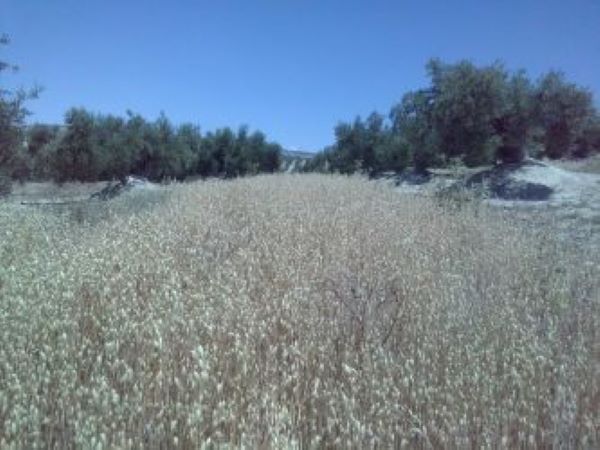The diversifications of the Diverfarming project in Andalusia continue moving forward despite the pandemic, with results of 3000kg per hectare of oats grown in the olive grove
The low price of olive oil in the market, added to the environmental problems of erosion and loss of soil that Andalusian olive groves face, open the door to new management strategies, such as crop diversification and the low input practices proposed by the European Diverfarming project, financed by the European Commission’s H2020 programme.
The team from the University of Cordoba working on Diverfarming, consisting of the researchers Beatriz Lozano, Luis Parras and Manuel González are responsible for managing case study 4 of the project: a traditional olive grove with erosion problems, located in Torredelcampo (Jaén). Despite the situation caused by the COVID-19 pandemic, the team has continued working on harvesting the oats sown in the alleys of the olive grove, obtaining results of around 3000 kg per hectare of oats grown in the olive grove.
In addition to the economic benefit for the olive growing community that a second harvest confers them, the environmental benefits are also relevant. The research group has detected how sowing oats as vegetation cover has reduced erosion compared to monocropping. Furthermore, the oats create considerable cover for the soil and have a high biomass content, which has produced higher carbon sequestration, thus reducing the carbon emissions and achieving soils with more organic matter, and therefore, greater fertility.

In this case study, diversification with lavender is also being trialled; this will be harvested shortly, with a good harvest also being expected.
Diverfarming is a project financed by the Horizon 2020 Programme of the European Commission, within the challenge of “Food Security, Sustainable Agriculture and Forestry, Marine, Maritime and Inland Water Research and the Bioeconomy”, which counts on the participation of the Universities of Cartagena and Córdoba (Spain), Tuscia (Italy), Exeter and Portsmouth (United Kingdom), Wageningen (Netherlands), Trier (Germany), Pecs (Hungary) and ETH Zurich (Switzerland), the research centres Consiglio per la ricerca in agricoltura e l’analisi dell’economia agraria (Italy), the Consejo Superior de Investigaciones Científicas (Spain) and the Natural Resources Institute LUKE (Finland), the agrarian organisation ASAJA, and the companies Casalasco and Barilla (Italy), Arento, LogísticaDFM and Industrias David (Spain), Nieuw Bromo Van Tilburg and Ekoboerdeij de Lingehof (Netherlands), Weingut Dr. Frey (Germany), Nedel-Market KFT and Gere (Hungary) and Paavolan Kotijuustola and Polven Juustola (Finland).








